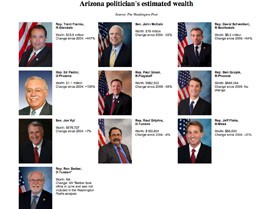Cronkite News has moved to a new home at cronkitenews.azpbs.org. Use this site to search archives from 2011 to May 2015. You can search the new site for current stories.
Four millionaires among Arizona’s congressional delegation, report says
WASHINGTON – At least four members of Arizona’s congressional delegation had estimated wealth of more than $1 million in 2010, according to a report by the Washington Post.
Rep. Trent Franks, R-Glendale, topped the list with an estimated net worth of $33.9 million, an increase of more than 400 percent since 2004, according to the analysis.
He was followed by Republican Sen. John McCain with $16 million, Rep. David Schweikert, R-Scottsdale, with $6.2 million, and Rep. Ed Pastor, D-Phoenix, with $1.1 million.
Rep. Paul Gosar, R-Flagstaff, was just shy of the mark at $982,500.
But Gosar, like all the lawmakers in the Post’s 535-member analysis, could have had net worth higher or lower because of imprecision in the reporting Congress requires of itself.
The report was based on annual financial disclosures in which members are required to report assets and liabilities only in broad ranges. They are not required to list homes, non-interest-bearing accounts or the congressional retirement savings plan.
John Hudak, a governance studies fellow at the Brookings Institution, said those exclusions blur the financial picture.
“Any information is better than none, but these reports leave a lot to be desired,” Hudak said.
Calls this week to members of Arizona’s delegation seeking response to the estimates – or comments on their accuracy – were not returned.
But Arizona lawmakers did not stand out in the report when compared to their colleagues.
Franks ranked 13th-highest in the House, and 23rd in Congress overall. But his reported $33.9 million was dwarfed by Rep. Darrell Issa, R-Calif., whose net worth the Post estimated at $448.1 million. Rep. Alcee Hastings, D-Fla., was at the bottom of the list with an estimated net worth of negative $4.7 million.
Sen. John Kerry, D-Mass., had the Senate‘s highest estimated wealth at $231.7 million, while Sen. Deborah Stabenow, D-Mich., had the lowest at minus $32,500. McCain ranked 19th-richest in the Senate.
The report said median wealth rose to $2.6 million in the Senate and $746,002 in the House in 2010.
The wealth estimates are composite averages of the minimum and maximum values of tiered categories that lawmakers indicate on self-disclosure forms. Those categories are ranges, not discrete values.
“It’s a tradeoff between some level of privacy and the need for our elected officials to tell us a little about their financial situation,” Hudak said. “We’re unable to assess change in the value of these investments unless they cross thresholds.”
But John Samples, director of the Cato Institute’s Center for Representative Government, said the argument can be made for excluding assets such as their homes from disclosure. Without careful analysis, he said, the bottom line numbers can lead to irrational assumptions.
“Keep in mind that even some of these people who don’t seem particularly rich have a financial profile much higher than that of the average American,” Samples said.
“A lot of these sums here are really big sums. People will somewhat irrationally assume there’s something wrong here,” he said.
Samples said that even if they just drew a salary – currently $174,000 for rank-and-file senators and representatives – lawmakers would make more than most Americans. And he added that “some of these people have been in Congress for 20 to 30 years.”
Hudak said there is a bias in the Senate toward having wealthier members, particularly in large states.
“A candidate must have a much larger base of support, so oftentimes the individuals who are in those positions must have exceptional relationships in the policy and business communities,” Hudak said.
“It’s not that the Senate is making people wealthy, rather the wealthy are making the Senate,” he said.







